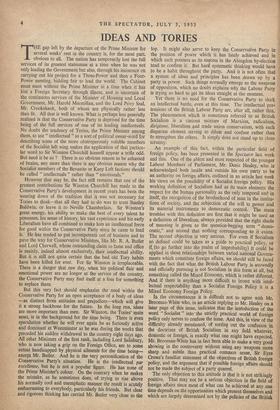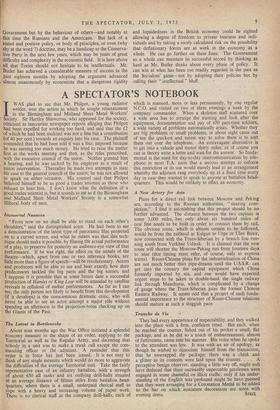IDEAS AND TORIES
THE gap left by the departure of the Prime Minister for several weeks' rest in the country is, for the most part, obvious to all. The nation has temporarily lost the full services of its greatest statesman at a time when he was not only leading the Government but also, through his insistence on carrying out his project for a Three-Power and then a Four- Power meeting, bidding fair to lead the world. The Cabinet must meet without the Prime Minister at a time when it has lost a Foreign Secretary through illness, and is uncertain of the continuous services of the Minister of Housing and Local Government, Mr. Harold Macmillan, and the Lord Privy Seal, Mr. Crookshank, both of whom are physically rather less than fit. All that is well known. What is perhaps less generally realised is that the Conservative Party is deprived for the time being of the full services of one of its leading intellectuals. No doubt the tendency of Tories, the Prime Minister among them, to use " intellectual " as a sort of political swear-word for describing some of the more obstreperously voluble members of the Socialist left wing makes the application of that particu- lar word to Sir Winston Churchill himself appear a trifle odd. But need it be so ? There is no obvious reason to be ashamed of brains, any more than there is any obvious reason why the Socialist members of the Bevanite or Keep Left factions should be called " intellectuals " rather than " emotionals."
However that may be, the fact still remains that one of the greatest contributions Sir Winston Churchill has made to the Conservative Party's development in recent years has been the wearing down of the tradition that it was not necessary for Tories to think—that all they had to do was to trust Stanley Baldwin, or leave it to Neville Chamberlain. Sir Winston's great energy, his ability to make the best of every talent he possesses, his sense of history, his vast experience and his early Liberalism have all combined to make him an intellectual force for good within the Conservative Party since he came to lead it. He has tended to put incompetents out of business and to pave the way for Conservative Ministers, like Mr. R. A. Butler and Lord Cherwell, whose outstanding claim to fame and office is mainly, indeed almost exclusively, their intellectual ability. But it is still not quite certain that the bad old Tory habits have been killed for ever. For Sir Winston is irreplaceable. There is a danger that one day, when his political flair and emotional power are no longer at the service of the country, the Conservative Party may find itself at a loss for something to replace them.
But this very fact should emphasise the need within the Conservative Party for an open acceptance of a body of ideas —as distinct from attitudes and prejudices—which will give it a strong backbone for the future. In the long run, ideas are more important than men. Sir Winston, the Tories' main asset, is in the background for the time being. There is even speculation whether he will ever again be as furiously active and dominant at Westminster as he was during the weeks that preceded his sudden withdrawal to the country eight days ago. All other Ministers of the first rank, including Lord Salisbury, who is now taking a grip on the Foreign Office, are to some extent handicapped by physical ailments for the time being except Mr. Butler. And he is the very personification of the Conservative Party's situation. He is the intellectual par excellence, but he is not a popular figure. He has none of the Prime Minister's colour. On the contrary when he makes the mistake, as he sometimes does, of trying to rise above his normally cool and unemphatic manner the result is acutely embarrassing to everybody, particularly his friends. But clear and rigorous thinking has carried Mr. Butler very close to the top. It might also serve to keep the Conservative Party in the position of power which it has lately achieved and in which such pointers as its sulcess in the Abingdon by-election tend to confirm it. But hard systematic thinking would have to be a habit throughout the party. And it is not often that a system of ideas and principles has been drawn up by a party in power. Such things normally emerge as the weapons of opposition, which no doubt explains why the Labour Party is trying so hard to get its ideas straight at the moment.
Yet there is no need for the Conservative Party to shirk an intellectual battle, even at this time. The intellectual pre- tensions of the British Labour Party are, after all, rather thin. The phenomenon which is sometimes referred to as British Socialism is a curious mixture of Marxism, radicalism, dirigisme, liberalism and trade union conservatism, with each disparate element serving to dilute and confuse rather than fo strengthen the others. It simply does not stand up to close scrutiny.
An example of this fact, within the particular field of foreign policy, has been presented in the Spectator last week and this. One of the ablest and most respected of the younger Labour Members. of Parliament, Mr. Denis Healey, who is acknowledged both inside and outside his own party to be an authority on foreign affairs, outlined in an article last week his views on the possibility of a Socialist foreign policy. His working definition of Socialism had as its main elements the respect for the human personality as the only temporal end in itself, the recognition of the brotherhood of man in the institu- tions of society, and the subjection of the will to power and its material instruments to democratic control. The main troubles with this definition are first that it might be used as a definition of liberalism, always provided that the right shade of meaning is given to the question-begging term " demo- cratic," and second that nothing corresponding to it exists. The second objection is very serious. For even if Socialism so defined could be taken as a guide to practical policy, or if, (to go further into the realm of improbability) it could be applied in those relationships between varied national Govern- ments which constitute foreign affairs, we should still be faced with the fact that what the British Labour Party is avowedly and officially pursuing is not Socialism in this form at all, but something called the Mixed Economy, which is rather different. And if there is anything more difficult to invest with intel- lectual respectability than a Socialist Foreign Policy it is a Mixed Economy Foreign Policy.
In the circumstances it is difficult not to agree with Mr. Brooman-White who, in an article replying to Mr. Healey on a later page of this issue, indicates that the introduction of the word " Socialist " into the strictly practical world of foreign policy only serves to confuse the issue. And this, in view of the difficulty already mentioned, of sorting out the confusion in the doctrines of British Socialism in any field whatever, domestic or foreign, is exactly what one might have expected. Mr. Brooman-White has in fact been able to make a very good showing in the controversy without using any weapons more sharp and subtle than practical common sense, Sir Eyre Crowe's familiar statement of the objectives of British foreign policy, and the argument that if possible foreign affairs should not be made the subject of a party quarrel.
The only objection to this attitude is that it is not strikingly positive. That may not be a serious objection in the field of foreign affairs since most of what can be achieved at any one time depends on the opportunities which present themselves and which are largely determined not by the policies of the British Government but by the behaviour of others—and notably at this time the Russians and the Americans. But lack of a stated and positive policy, or body of principles, or even (why shy at the word ?) doctrine, may be a handicap to the Conserva- tive Party in the next few years, which may be years of great difficulty and complexity in the economic field. It is here above all that Tories should not hesitate to be intellectuals. Mr. Butler has achieved a considerable measure of success in the past eighteen months by adopting the argument advanced . almost unanimously by economists that a dangerous rigidity and lopsidedness in the British economy could be righted allowing a degree of freedom to private business and indi- viduals and by taking a nicely calculated risk on the possibility that deflationary forces are at work in the economy as a whole. He can go further on these lines. The Government as a whole can maintain its successful record by thinking as hard as Mr. Butler thinks about every phase of policy. It can win at what has been too readily regarded in the past as the Socialists' game—not by adopting their policies but by calling their " intellectual." bluff.



























































 Previous page
Previous page